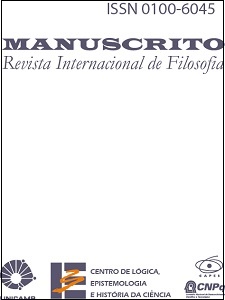Resumo
In his paper John Corcoran examines in detail many issues relating to logical form, and raises some questions about my formulations. In my response I emphasize two main distinctions that may clear up some of the issues. One is the distinction between logical forms, in the sense of logical properties of an abstract character, and logical form, in the sense in which we speak of the logical form (or logical structure) of a sentence, or of a proposition. Another is the distinction, emphasized by Boole, between primary propositions (about things), and secondary propositions (about propositions)—which I illustrate through the distinction between predicate negation and sentential negation.
Resumo:
Em seu artigo John Corcoran examina em detalhe muitas questões sobre forma lógica e levanta alguns problemas relativos à minhas formulações. Na réplica enfatizo duas distinções principais, que podem esclarecer algumas questões. A primeira é a distinção entre formas lógicas, no sentido de propriedades lógicas de caráter abstrato, e forma lógica, no sentido em que falamos da forma lógica (ou estrutura lógica) de uma sentença ou de uma proposição. A segunda é a distinção, enfatizada por Boole, entre proposições primárias (sobre coisas) e proposições secundárias (sobre proposições), exemplificada com a distinção entre negação predicativa e negação sentencial.
Palavras chave: Formas lógicas. Forma lógica. Propriedade lógica. Predicação. Negação.
Referências
CHURCH, A. Introduction to Mathematical Logic. Princeton, N.J.: Princeton University Press, 1956.
FREGE, G. “Thoughts”. In Collected Papers on Mathematics, Logic, and Philosophy, edited by B. McGuinness. Oxford: Blackwell, 1984.
QUINE, W. V. Philosophy of Logic. Englewood Cliffs, N.J.: PrenticeHall, 1970.
SAUTTER, F. T. “Chateaubriand on the Nature of Logic”. Manuscrito, 27, pp. 95-104, 2004.
TARSKI, A. “What are Logical Notions?” History and Philosophy of Logic, 7, pp. 143-154, 1986.

